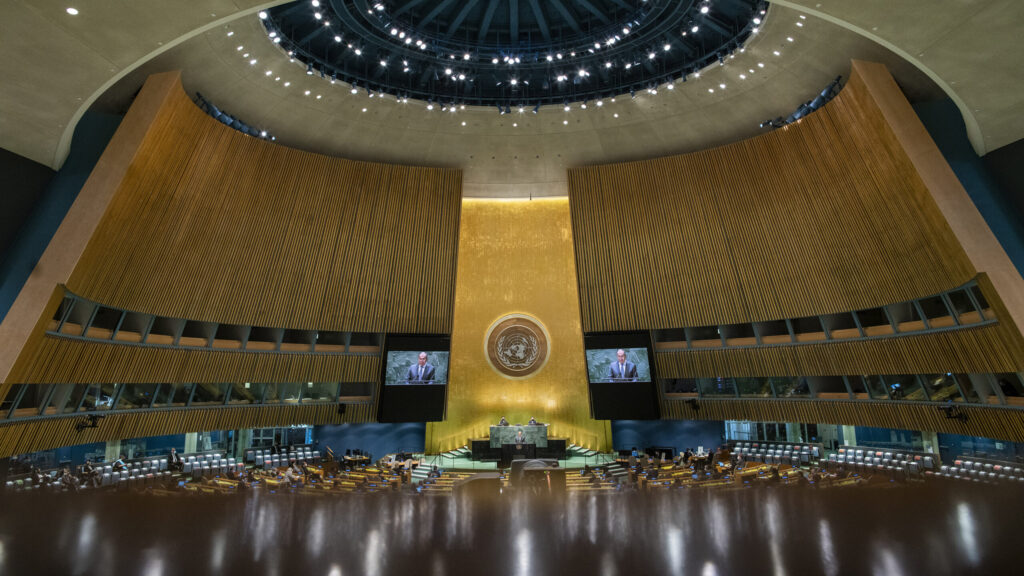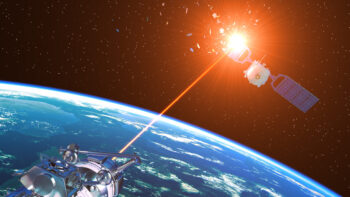THERESA HITCHENS

WASHINGTON — The UN working group attempting to develop norms to constrain threatening military activities in space today ended with a bang — as Russia threw firebomb after firebomb into the process, blocking forward motion against the clear wishes of a majority of participating countries.
UN working groups function on the basis of consensus, meaning that any one nation can veto the proceedings.
Moscow, which voted against the original establishment of the working group — officially, the UN Open Ended Working Group (OEWG) on Reducing Space Threats Through Norms, Rules and Principles of Responsible Behavior — on Thursday made it clear it would not allow the group to issue a formal report to the UN General Assembly detailing the proposals discussed and areas of budding accord.
Today, the Russian delegation went even further — pulling out the diplomatic nuclear option by quashing even a procedural report to mark the group’s two years of work, to the dismay of many delegates who expressed fears that the move sets a negative precedent for future proceedings.
“The fact that even a procedural report describing the technical unfolding of the OEWG was blocked speaks volumes about a desire to see this process fail. Yet the statements from the vast majority of delegates show that despite disagreement on documentation, the process itself was a success,” said Jessica West, who has been documenting the meeting for Canada’s Project Ploughshares.
The head of Russia’s delegation, Konstantin Vorontosov, asserted that Moscow’s positions had been “discriminated against and ignored,” despite the fact that the draft report [PDF] circulated by the OEWG chair, Hellmut Lagos Koller of Chile, included explicit reference to Russia’s joint proposal with China for a legally binding treaty to prevent the placement of weapons in outer space.
He further argued the very concept of responsible behavior in space is not just internationally divisive, but illegitimate, and thus should not be an item on the UN’s agenda. A small number of nations, including Venezuela, Iran and China, supported Russia’s objections, especially its rejection of responsible behavior as a foundation for norms.
A majority, however, pushed back by making detailed statements designed to put the group’s progress on the record, and further supported the chair’s decision to submit an informal summary of the discussions to the UNGA.
“The sessions of the OEWG, including this week, have demonstrated a significant interest among states in finding converging views on reducing space threats,” said Philippines representative Jonelle John Domingo, representing a cross-regional group of 39 nations.
Those nations included Argentina, Australia, Austria, Belgium, Brazil, Canada, Chile, Costa Rica, Colombia, Czech Republic, Denmark, Ecuador, El Salvador, Finland, France, Germany, Greece, Ireland, Italy, Japan, Luxembourg, Malawi, Mexico, the Netherlands, New Zealand, Nigeria, Norway, Panama, Peru, the Philippines, Portugal, the Republic of Korea, Samoa, Singapore, Spain, Sweden, Switzerland, the United Kingdom, and Uruguay.
Among the concepts that garnered growing support during the meeting was the US proposal of a voluntary ban on testing of destructive, direct ascent anti-satellite (ASAT) missiles, with some nations even suggesting that the ban be expanded to testing and use of all types of destructive ASAT weapons.
Eric Desautels, acting deputy assistant secretary for arms control, verification and compliance at the State Department who headed the US delegation to the OEWG, thanked those nations who have supported the proposal. Further, like many other representatives at the meeting, he insisted that the working group’s endeavors had not been in vain.
“[I]mportant first steps have been taken,” he said, toward an international agreement “that can reduce risks to international peace, security and stability and play an important role in increasing predictability and reducing risks of misperceptions.”
A large number of countries also expressed support for a set of norms designed to flesh out how to implement the concept of “due regard” for other nation’s space activities, a provision included but not well defined in the 1967 Outer Space Treaty.
Most states also supported the idea of a follow-on OEWG designed to pursue those ideas gaining growing support. In fact, only Russia spoke out against the idea.
“We do not share and do not support the proposals that are tabled by summit delegations to resume this process in the future,” said Vorontosov.
He instead exhorted states to put their attention on the upcoming Nov. 20-Dec. 1 meeting of the UN Group of Governmental Experts on Prevention of an Arms Race in Outer Space led by Russia that will concentrate on treaty proposals.
Given the fact that the US and its allies consistently have rejected the foundations of the Russian-Chinese treaty, the prospects for any substantive outcome at that meeting are dim — and no doubt have been dimmed even further by Russia’s take no prisoners approach to the OEWG.

No comments:
Post a Comment